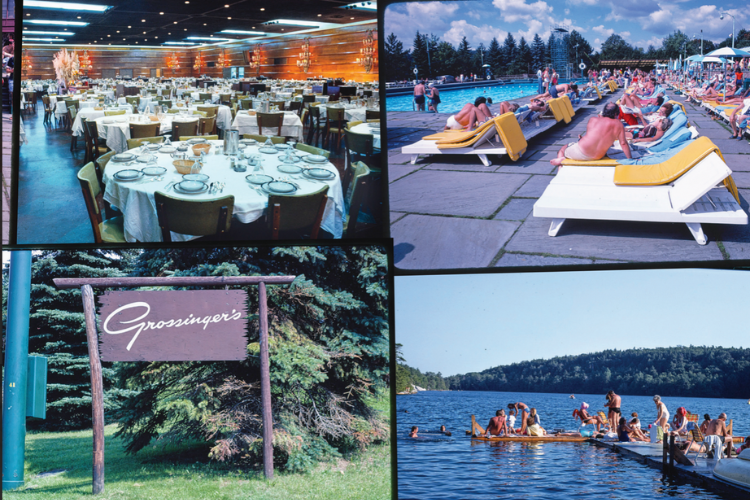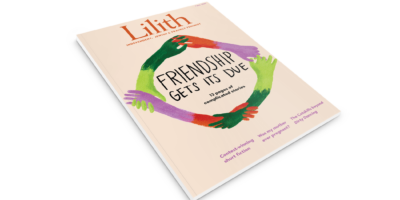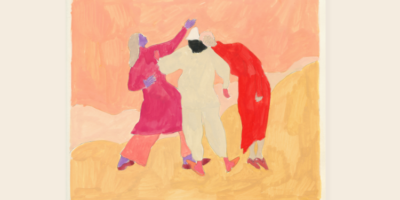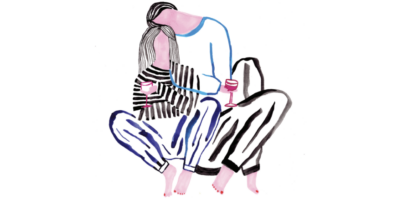
PHOTOS: LIBRARY OF CONGRESS, PRINTS & PHOTOGRAPHS DIVISION, PHOTOGRAPH BY JOHN MARGOLIES
On Misplaced Catskills Nostalgia
As someone who grew up at my grandparents’ hotel in the heart of the Jewish Catskills, I frequently annoy my friends by pointing out errors in such cult favorites as Dirty Dancing and The Marvelous Mrs. Maisel.
In the former, when Baby first enters Johnny’s cabin, she is appalled by the squalor in which he is forced to live. When I saw that cabin, I burst out laughing: at most Borscht Belt resorts (my family’s included), that cabin would have been the Presidential Suite. No guests got a cottage as luxurious as the one Baby’s family is assigned at Kellerman’s … or the lakeside mansion Midge Maisel’s family returns to year after year, for two full months, at Steiner’s.
Virtually no one shlepped a trailer full of clothes to the Mountains, as Midge and her parents do. Nor were they assigned a special “boy” whose only wish was to satisfy their every whim. Hardly anyone spent the entire summer at a resort as fancy as Steiner’s; that was what families did at the shabbier bungalow colonies that dotted the landscape, with only a pool, a ping-pong table, and maybe a TV room to divert them. (The movie Walk on the Moon provides a more faithful representation of that experience.)
If Borscht Belt resorts had been as glamorous as Kellerman’s or Steiner’s, they wouldn’t have gone out of business. And by the way, an up-and-coming comic like Midge Maisel would have been dying to play every resort in the county. (To give credit where credit is due, Susie’s squalid quarters, crammed with bunks for the female staff, are much more realistic than Johnny’s cabin.)
I’m not only a grouch about the lack of accuracy. What makes me queasy is the recent surge of nostalgia for the glory days of the Catskills. On Facebook, hundreds of elderly Jews grieve the loss of a world as magical as Shangri-la, while Jews who weren’t conceived until twenty years after the last Catskills resort burned down express their yearning for a paradise that never existed and seriously propose rebuilding it. A museum of Borscht Belt culture and history opened last month in Ellenville (I agreed to serve on the board, if only to assure a curmudgeon’s point of view), and I recently was interviewed for a documentary about Grossinger’s, whose loss American Jews lament more than the Second Temple’s.
I would be the first to admit the Catskills provided a much-needed refuge for Jewish immigrants. After millennia of poverty and persecution, not to mention the Great Depression, the Holocaust, and World War II, Jews finally found a place where they could relax and enjoy themselves without fear of anything worse than poison ivy. Rather than worry about going hungry, they could gorge on platters of kosher food. They could speak English without native-born Americans making fun of their accents. They could learn to play tennis, baseball, basketball, or racquetball, swim, ride a horse, or, at the larger, year-round resorts, ski or ice skate. They could entrust their children to Jewish counselors, then lounge by the pool playing mah-jongg or pinochle, smoke a cigar, go for a walk along a verdant country road. Free from their parents’ cramped apartments, they could seek out members of the opposite gender—or even the same gender—and dance, make out, or find a spouse.
And yet, most of the owners’ offspring were only too glad to be relieved of the obligation of taking over their family business. The work was killing, for management and staff alike (I will never understand how the waiters survived three meals a day, seven days a week, except that they knew their tips would finance the next year’s tuition). The smaller resorts were open only from Memorial Day to Labor Day, which meant they had no hope of breaking even. And many of us who lived year-round in tiny rural towns such as Liberty, Fallsburg, or Monticello bemoaned the lack of opportunities and sophistication. (When I entered Yale in 1974, my Jewish classmates took pains to inform me that their families wouldn’t have been caught dead vacationing in the tacky Catskills.) On the positive side, this spurned us to study hard and hone our talents; a disproportionate number of my contemporaries went on to impressive careers in science, law, academia, the arts, and entertainment.
If you want an idea of how desperate many of us were to escape our families’ resorts, you need to watch Taking Woodstock, which opens with the owners’ son trying to convince his father that dumping laundry bleach into the hotel pool instead of chlorine might poison the guests. Elliot pours his youth and energy into saving his parents’ hotel, only to discover that his mother, who has been driven half mad by the hardships she has endured, has been hoarding cash beneath the floorboards for decades.
Not only did we natives not want to take over our families’ resorts, Jews our age no longer wanted to vacation there. The reason the hotels had sprung up in the first place was that our immigrant grandparents were crammed in stifling tenements on the Lower East Side, ruining their eyes and lungs in sweatshops. When they tried to escape the heat, they learned gentile-owned resorts wouldn’t admit them; nor would most sanitaria allow Jews to check in to cure their tuberculosis. When they finally were allowed to vacation where they pleased, they decided they would rather fly to Paris, Israel, Hawaii, or the Bahamas than drive 90 miles up Route 17 to the pleasant but not-so-spectacular foothills of the actual Catskills, which border the lordly Hudson River to the east. As Max Kellerman kvetches at the end of Dirty Dancing, “You think kids want to come with their parents and take fox-trot lessons? Trips to Europe, that’s what the kids want.”
And why shouldn’t Jews have wanted more than mildew-scented guestrooms with lumpy mattresses and a bathroom down the hall? Or heavy, bland, unimaginative food? For all that the Borscht Belt gave birth to American comedy, by the late 1950s, all those one-liners about mother-in-laws and wives had grown so moldy they made audiences long for the fresher, more observational routines they could find only in Manhattan nightclubs. Nor did younger Jews want to vacation at hotels where every other guest would be Jewish and white, especially if they had married spouses who were neither.
Do we really want to bring back the days when Jews weren’t allowed to check into nice hotels or sanitaria? (While we’re at it, why not bring back tuberculosis?) Or the days when members of the Jewish mob used the Mountains as a dumping ground for their strangled or ice-picked victims? (My father told me that when Abe “Kid Twist” Reles appeared in our hotel dining room, expecting my grandparents to provide a free Sabbath meal for him and his extended family, he broke out in a cold sweat and his genitalia shriveled up to nothing.)
Tipsy on nostalgia, we forget how very far we have come, how very quickly. As late as the 1980s, when Dirty Dancing came out, few gentiles would pay to see a movie about Jewish characters.
That’s why no one says the word “Jewish” or “Jew” in the entire movie, barely anyone drops a word of Yiddish, and no one mentions that Baby’s relationship with Johnny is problematic not only because he is working class and sexually more experienced, but also because he isn’t Jewish.
For all that Dirty Dancing deliberately obscures Baby’s religion, the whole point is that Baby is determined to break free of the straitjacket of the “nice, smart Jewish girl” who is supposed to attend a good college, earn a degree in economics or English lit, marry a doctor, teach or do a little social work, then give it all up to produce the next crop of nice Jewish children. Baby—or, rather, Frances—proves that even nice, smart Jewish girls can be sexy. Can think for themselves. Can carve out their own identities as caring, talented women who long to get to know people from other backgrounds. What I love most about Baby is that, unlike the other guests, she wanders off to see where the employees live and volunteers to carry that watermelon up those stairs.
“Tipsy on nostalgia, we forget how very far we have come… As late as the 1980s, when Dirty Dancing came out, few gentiles would pay to see a movie about Jewish characters.”
That’s the same lesson Midge Maisel teaches: that a Jewish girl can be both sexy and smart, not to mention original, weird, and scandalous. Certainly, Baby and Midge derive aspects of their identity from their Jewish upbringing. But they don’t confine themselves to what might be expected of a nice Jewish girl vacationing in the Borscht Belt.
I understand why so many Jews yearn for the community they experienced in the Catskills. With so many antisemites marching in the streets, bombarding us with their hate-filled conspiracy theories, and shooting up our synagogues, we find ourselves pining for our own safe, segregated enclaves.
But what makes Dirty Dancing great isn’t its Catskills setting; what makes it great is Baby’s desire to fulfill her unlimited potential as a woman, a Jew, and a human being, her instinct to put into practice the Jewish values her father taught her, her determination to transform the world so that everyone, rich or poor, gentile or Jew, owner or guest or employee, feels they are having the time of their lives in a truly nonsexist, multicultural, multiracial, classless Eden.
Eileen Pollack is the author, most recently, of the essay collection, Maybe It’s Me: On Being the Wrong Kind of Woman.






